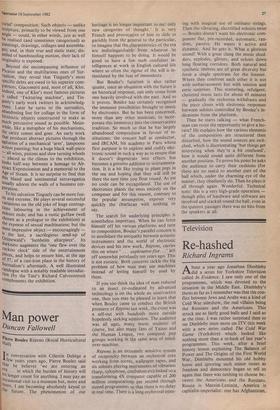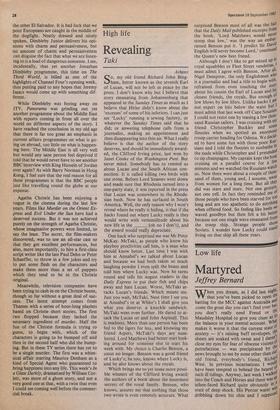Television
Re-hashed
Richard Ingrams About a year ago Jonathan Dimbleby did a series for Yorkshire Television called In Evidence. I saw only one of the programmes, which was devoted to the situation in the Middle East. Dimbleby's thesis as far as I remember was that the con- flict between Jews and Arabs was a kind of Cold War sideshow, the real villains being the Russians and the Americans. This struck me as fairly good balls and I said so at the time. I was rather surprised then to see Dimbleby once more on ITV this week with a new series called The Cold War Game (Yorkshire) which looked like nothing more than a re-hash of last year's programmes. This week, after a brief history lesson explaining The Balance of Power and The Origins of the First World War, Dimbleby mounted his old hobby horse and ignoring such minor issues as freedom and democracy began to tell us again that there was nothing to choose be- tween the Americans and the Russians. Russia is Marxist-Leninist, America is capitalist-imperialist: one has Afghanistan, the other El Salvador. It is bad luck that we poor Europeans are caught in the middle of the dogfight. Neatly dressed and nicely spoken, Dimbleby Junior delivers his opi- nions with charm and persuasiveness, but no amount of charm and persuasiveness can disguise the fact that what we are listen- ing to is a load of dangerous nonsense. I see, incidentally, that yet another Jonathan Dimbleby programme, this time on The Third World, is billed as one of the highlights of Channel Four's opening week, thus putting paid to any hopes that Jeremy Isaacs would come up with something dif- ferent.
While Dimbleby was boring away on ITV, Panorama was grinding out yet another programme about the Middle East with reports coming in from all over the world on different aspects of the story. I have reached the conclusion in my old age that there is far too great an emphasis in current affairs programmes on what is go- ing on abroad, too little on what is happen- ing here. The Middle East is all very well but would any sane person feel deprived if told that he would never have to see another BBC interview with King Hussein of Jordan ever again? As with Barry Norman in Hong Kong, I feel sure that the real reason for all these programmes is that the BBC people just like travelling round the globe at our expense.
Agatha Christie has been enjoying a vogue in the cinema during the last few years. Films like Murder on the Orient Ex- press and Evil Under the Sun have had a deserved success. But it was not achieved purely on the strength of Agatha Christie, whose imaginative powers were limited, to say the least. The secret, the film-makers discovered, was to use an all-star cast so that they got excellent performances, but also, more importantly, to hire a first-class script writer like the late Paul Dehn or Peter Schaeffer, to throw in a few jokes and try to put some flesh on the characters and make them more than a set of puppets which they tend to be in the Christie original.
Meanwhile, television companies have been trying to cash in on the Christie boom, though so far without a great deal of suc- cess. The latest attempt comes from Thames with a series of hour-long playlets based on Christie short stories. The first two flopped because they lacked the necessary ingredient of murder. Half the fun of the Christie formula is trying to guess, to begin with, which of the characters is going to be bumped off and then in the second half who did the bump- ing. But in these TV series there has yet to be a single murder. The first was a whim- sical affair starring Maurice Denham as a kind of Special Agent who guaranteed to bring happiness into any life. This week's In a Glass Darkly, dramatised by William Cor- lett, was more of a ghost story, and not a very good one at that, with a twist that even I could see coming well before the commer- ' cial break.



































 Previous page
Previous page